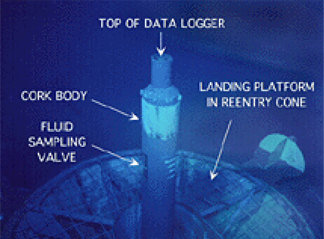Advanced CORK’s in 21st Century
December 15-16, 1997 – La Jolla, California
Convener: Earl Davis, Keir Becker

Summary
The workshop was convened to outline the scientific objectives and general technical requirements for the next generation of ODP instrumented borehole seals or “CORKs” (Circulation Obviation Retrofit Kits). CORKs were initially developed in 1990-1991 for thermal and physical characterization of subseafloor hydrology, and 13 CORKs have been deployed to date in a variety of hydrologic settings. There is great interest in the potential of future CORKs for enhanced hydrological monitoring and testing, for sampling of subsurface fluids and microbiology, and for deployment of additional geophysical instrumentation hydraulically isolated beneath the seafloor.
The workshop was attended by 25 earth scientists and engineers representing a broad spectrum of disciplines, ranging among hydrogeology, seismology, geochemistry, microbiology, paleoceanography, and drilling engineering. Reviews of existing CORK technology and recent scientific results were followed by discussions of directions for future CORK science. Specific needs for future CORKs were then explored in the context of two generic hydro-lithologic sections representative of subduction complexes and oceanic crust. Discussions were focussed on settings most appropriate for CORK installations, i.e., where hydrogeologically active formations or structures can be intersected below naturally low-permeability sediments through which casing can be set.
Organizing Committee
Keir Becker, University of Miami
Earl Davis, Geological Survey of Canada






